 W
WBarabbas is a 1961 religious epic film expanding on the career of Barabbas, from the Christian Passion narrative in the Gospel of Mark and other gospels. The film stars Anthony Quinn as Barabbas, features Silvana Mangano, Katy Jurado, Arthur Kennedy, Harry Andrews, Ernest Borgnine, Vittorio Gassman, and Jack Palance, and was distributed by Columbia Pictures. It was conceived as a grand Roman epic, was based on Nobel Prize-winning Pär Lagerkvist's 1950 novel of the same title. A previous film version of the novel, in Swedish, had been made in 1953.
 W
WFire Over Rome is a 1965 Italian peplum film directed by Guido Malatesta.
 W
WHistory of the World, Part I is a 1981 American comedy film written, produced, and directed by Mel Brooks. Brooks also stars in the film, playing five roles: Moses, Comicus the stand-up philosopher, Tomás de Torquemada, King Louis XVI, and Jacques, le garçon de pisse. The large ensemble cast also features Sid Caesar, Shecky Greene, Gregory Hines, Charlie Callas; and Brooks regulars Ron Carey, Dom DeLuise, Madeline Kahn, Harvey Korman, Cloris Leachman, Andreas Voutsinas, and Spike Milligan.
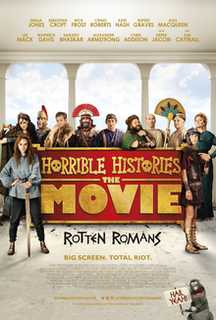 W
WHorrible Histories: The Movie – Rotten Romans is a 2019 British historical comedy film directed by Dominic Brigstocke, based on the book series of the same name by author Terry Deary, and the television series of 2009 and 2015 on CBBC. The film production, of one of the stories, was announced in March 2016. The film is a co production, between Altitude Film Entertainment, BBC Films and Citrus Films. It was released on 26 July 2019.
 W
WHumanity Through the Ages, released in the US initially as Humanity Through Ages, is a 1908 historical drama film directed by Georges Méliès. The film, now presumed lost, is an episodic narrative displaying examples of humankind's brutality, from the story of Cain and Abel through the Hague Convention of 1907.
 W
WNero is a 1922 American-Italian silent historical film directed by J. Gordon Edwards and starring Jacques Grétillat, Sandro Salvini, and Guido Trento. It portrays the life of the Roman Emperor Nero.
 W
WNero and the Burning of Rome is a 1953 Italian epic historical drama film directed by Primo Zeglio and loosely based on real life events of Roman emperor Nero. It was based on the novel Nerone e Messalina (c.1949) by Harry Bluhmen.
 W
WMio figlio Nerone, released in the US as Nero's Mistress is a 1956 Italian historical comedy film directed by Steno and starring Alberto Sordi, Vittorio De Sica, Gloria Swanson and Brigitte Bardot, with cinematography by Mario Bava. It depicts a visit by the Roman Emperor Nero and his entourage to a coastal villa.
 W
WNerone (1930) is an Italian comedy film, directed by Alessandro Blasetti. It stars Ettore Petrolini as the main actor. It has been described as a "Roman farce", a genre which was popular in Italy at the time. It is a parody of the Roman Empire and of the notorious Roman emperor, Nero. It was shot at the Cines Studios in Rome.
 W
WNerone is a 1977 Italian comedy film directed by Castellacci & Pingitore. It parodies real life event of the Roman emperor Nero.
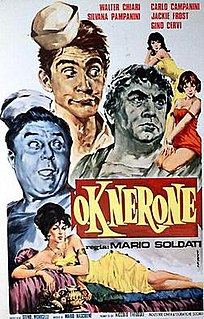 W
WO.K. Nerone is a 1951 Italian comedy film directed by Mario Soldati.
 W
WPer amore di Poppea is a 1977 Italian commedia sexy all'italiana directed by Mariano Laurenti and set in ancient Rome.
 W
WPoppea's Hot Nights is a 1969 Italian comedy film set in Ancient Rome. It was written and directed by Guido Malatesta and stars Olga Schoberová and Brad Harris in the main roles.
 W
WQuo Vadis is an Italian film directed by Enrico Guazzoni for Cines in 1913, based on the 1896 novel of the same name written by Henryk Sienkiewicz. It was one of the first blockbusters in the history of cinema, with 5,000 extras, lavish sets, and a lengthy running time of two hours, setting the standard for "superspectacles" for decades to come.
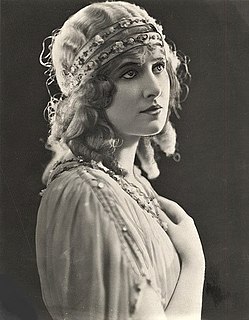 W
WQuo Vadis is a 1924 Italian silent historical drama film directed by Gabriellino D'Annunzio and Georg Jacoby and starring Emil Jannings, Elena Sangro and Lillian Hall-Davis. It is based on the 1896 novel Quo Vadis by Henryk Sienkiewicz which was notably later adapted into a 1951 film.
 W
WQuo Vadis is a 1951 American epic historical drama film made by Metro-Goldwyn-Mayer (MGM) in Technicolor. It was directed by Mervyn LeRoy and produced by Sam Zimbalist, from a screenplay by John Lee Mahin, S.N. Behrman, and Sonya Levien, adapted from the novel Quo Vadis (1896) by the Polish Nobel Laureate author Henryk Sienkiewicz. The score is by Miklós Rózsa and the cinematography by Robert Surtees and William V. Skall. The title refers to an incident in the apocryphal Acts of Peter.
 W
WQuo Vadis is a 2001 Polish film directed by Jerzy Kawalerowicz based on the 1896 book of the same title by Henryk Sienkiewicz. It was Poland's submission to the 74th Academy Awards for the Academy Award for Best Foreign Language Film, but was not nominated.
 W
WRoman Legion-Hare is a 1955 Warner Bros. Looney Tunes animated short directed by Friz Freleng. The short was released on November 12, 1955, and stars Bugs Bunny and Yosemite Sam. The title is a play on the words Roman Legionnaire. After being ordered by Emperor Nero to find a victim to be tossed to the lions, Yosemite Sam tries to capture Bugs Bunny.
 W
WSatiricosissimo is a 1970 Italian comedy film directed by Mariano Laurenti. It is a parody of the 1969 Federico Fellini film Fellini Satyricon.
 W
WThe Sign of the Cross is a 1914 American drama silent film directed by Frederick A. Thomson based on the 1895 play by Wilson Barrett. The film stars William Farnum, Rosina Henley, Sheridan Block, Morgan Thorpe, Ethel Grey Terry, Lila Barclay and George Majeroni. The film was released on December 21, 1914, by Paramount Pictures.
 W
WThe Sign of the Cross is a 1932 American pre-Code epic film produced and directed by Cecil B. DeMille and released by Paramount Pictures. Based on the original 1895 play by English playwright Wilson Barrett, the screenplay was written by Waldemar Young and Sidney Buchman. It stars Fredric March, Elissa Landi, Claudette Colbert, and Charles Laughton, with Ian Keith and Arthur Hohl.
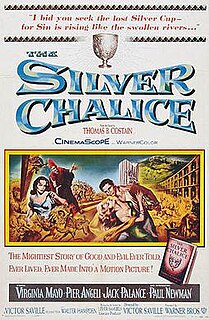 W
WThe Silver Chalice is a 1954 American historical epic film directed and produced by Victor Saville, based on Thomas B. Costain's 1952 novel of the same name. It was Saville's last film and marked the acting debut of Paul Newman; despite being nominated for a Golden Globe Award for his performance, Newman later called it "the worst motion picture produced during the 1950s".
 W
WThe Story of Mankind is a 1957 American fantasy film, very loosely based on the nonfiction book The Story of Mankind (1921) by Hendrik Willem van Loon. The film was directed and co–produced by Irwin Allen and released by Warner Bros. The all-star cast movie was a critical failure.
 W
WThe Ten Gladiators is a 1963 Italian film directed by Gianfranco Parolini.
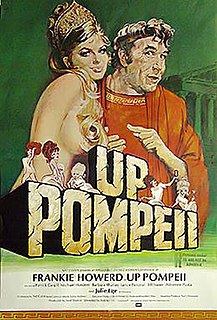 W
WUp Pompeii is a 1971 British sex comedy film directed by Bob Kellett and starring Frankie Howerd and Michael Hordern. The film was shot at Elstree Film Studios, Borehamwood, England and is based on characters that first appeared in the British television sitcom Up Pompeii! (1969–1975).